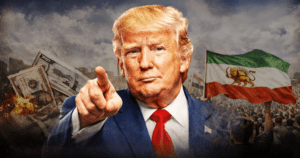In a striking departure from his historically conciliatory tone towards Russian President Vladimir Putin, U.S. President Donald Trump publicly labeled Putin as having “gone absolutely crazy” following Russia’s most extensive aerial assault on Ukraine since the onset of the conflict. This barrage, comprising 367 drones and missiles, resulted in at least 13 Ukrainian fatalities and numerous injuries. Trump’s remarks, disseminated via his Truth Social platform, underscored a significant shift in his stance, suggesting a deepening rift between the two leaders.
The Kremlin, through spokesperson Dmitry Peskov, dismissed Trump’s comments as stemming from “emotional overload,” attributing them to the heightened tensions surrounding the ongoing conflict. Peskov emphasized that such reactions are natural during critical junctures and reiterated Russia’s commitment to national security interests.
Erosion of the ‘Peacemaker’ Persona
Trump’s latest denunciation of Putin marks a notable departure from his previous attempts to position himself as a mediator in the Russia-Ukraine conflict. Earlier in his tenure, Trump had engaged in direct dialogues with both Putin and Ukrainian President Volodymyr Zelenskyy, advocating for immediate peace negotiations. These efforts included a high-profile summit in Saudi Arabia and proposals that were perceived by some as favoring Russian interests, such as suggesting Ukraine cede certain territories.
However, the intensification of Russian military actions, particularly the recent large-scale attacks on Ukrainian cities, appears to have catalyzed a reevaluation of Trump’s approach. His public condemnation of Putin’s actions signifies a potential pivot in U.S. foreign policy, reflecting the complexities of balancing diplomatic engagement with accountability.
Strategic Calculations and Global Implications
The Kremlin’s characterization of Trump’s statements as emotionally charged serves multiple strategic purposes. By framing the U.S. president’s remarks as impulsive, Russia aims to undermine the credibility of American criticisms while maintaining its narrative of rational self-defense. This tactic also seeks to exploit divisions within Western alliances, particularly as nations grapple with the appropriate response to escalating hostilities.
Concurrently, the United States, along with allies such as the United Kingdom, France, and Germany, has announced the lifting of range restrictions on weapons supplied to Ukraine. This decision enables Kyiv to utilize long-range missiles to target positions within Russian territory, signaling a significant escalation in Western military support and a unified stance against Russian aggression.
Navigating the Path Forward
This confrontation between Donald Trump and Vladimir Putin is not just another diplomatic skirmish. It marks a recalibration of Trump’s foreign policy messaging at a time when the U.S. is preparing for another polarizing election and the war in Ukraine is entering a more volatile phase. By branding Putin “crazy”, Trump is attempting to reframe his image—not as a dealmaker who appeases autocrats, but as a leader willing to challenge a belligerent Russia. Yet, this rhetorical pivot comes with consequences. The Kremlin’s swift dismissal of Trump as “emotional” is not just reactive—it’s calculated. It paints Trump as unstable and unreliable, qualities that Moscow may hope will sow confusion among U.S. allies or tilt domestic debates within the U.S. about support for Ukraine.
The implications stretch beyond campaign theater. As NATO allies expand their commitment—lifting range limits on Ukrainian weapon systems—Russia may interpret Trump’s statements as a green light for further escalation, or worse, as a sign of inconsistency in American leadership. This instability can embolden Moscow or alienate Washington’s partners, depending on how both figures double down. In an increasingly bipolar world order where rhetoric often fuels policy, every word uttered by leaders like Trump and Putin carries strategic weight. What remains uncertain is whether these exchanges will evolve into substantive policy shifts—or remain mere soundbites in a dangerously overheated geopolitical arena.














